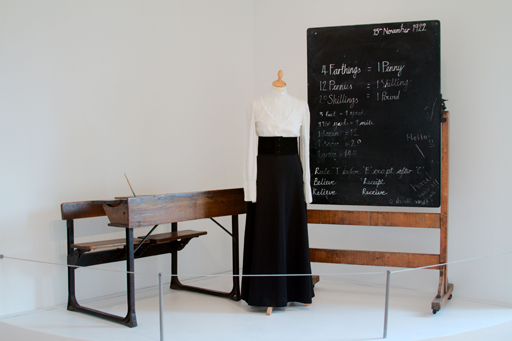Handsel number 1: scule
There are about 6 different pronunciations and 14 different spellings of the Scots word scule. This is in addition to the English spelling 'school' and the English pronunciation, 'skool'.
Activity 7
Listen to 5 different pronunciations of scule in Scots and match the pronunciations with the different spellings of the word. Then pronounce the variations and record yourself doing so. Compare your recording with our model.
Two lists follow, match one item from the first with one item from the second. Each item can only be matched once. There are 5 items in each list.
Word in audio No. 1
Word in audio No. 2
Word in audio No. 3
Word in audio No. 4
Word in audio No. 5
Match each of the previous list items with an item from the following list:
a.skill
b.scule, skule
c.s(c)kweel, squeel
d.sc(h)uil, skuil
e.scheel, skeel
- 1 = a,
- 2 = b,
- 3 = c,
- 4 = e,
- 5 = d
Much of the spelling variation can be accounted for with the realisation of the hard
Often the vowel is where dialectical variation can make things interesting.
The spellings skill, scöl, skweel/squeel, skeel, and skeul represent local dialect pronunciations. The spellings scule and scuil are pan-dialectic spellings, if we learn that our local dialect pronounces words spelled with
This understanding reflects a pan-dialectical approach to spelling that allows us to use a traditional Scots spelling convention and maintain our dialectical pronunciations of a variety of words.
Activity 8
Listen to the recording of different local dialect pronunciations of the words ‘just’ and ‘moon’ in Scots, following the explanation above. Here are the words you will hear:
muin, min, meen; jest, jist, juist.
Put these words in the order in which they appear in the recording.
Answer
Here is the order in which these six pronunciations appear in the recording:
jist, min, juist, muin, jest, meen
Use of ‘the’ and Standard Scots 
The grammar of this handsel word can be quite consistent across dialects. Each will likely precede the word with the definite article ‘the’. In Standard English one ought not to speak of “the school” unless referring to a particular school. Let’s look at the following example in Standard English:
- Jane was old enough to go into second year at school.
The grammar in English in the sentence above begs the question, 'which school?' Whereas the same sentence in Scots:
- Jean wis big eneuch fir tae ging intae saicont yeir at the scule.
….does not beg that question, it is well attested in Scots grammar.
A question with respect to a Standard Scots would be whether the sentence
'*Jean wis big eneuch fir tae ging intae saicont yeir at scule' without the definite article, ought to be thought of as grammatically incorrect Scots. Can one say this is “bad Scots”, or even that this is not Scots?
It can be quite common in written works for an author to use Scots vocabulary yet use Standard English grammatical rules. To remove the 'the' article does sound incorrect to Scots speakers who use this grammatical feature.
We do know that the definite article is applied to words in a systematic way in Scots, which is distinct from Standard English, as has been outlined in Unit 17 on grammar. In Unit 17 you learned that Scots uses determiners such as the definite article ‘the’ more often than Standard English does, for example in ‘the college, the cauld, the Gorbals’ etc. When we observe these relatively systematic features in a language, we can extract rules to prescribe how one ought to correctly write in a language.
20.2 How could one standardise Scots?

